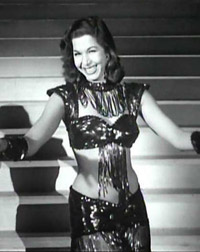
Nagwa Fouad نجوي فؤاد
1943
Nagwa Fouad was born in Alexandria, to an Egyptian father and a Palestinian mother from Nablus. Her parents went to Jaffa when she was three-months-old. There, she spent the first few years of her life..Her mother died a few months after Nagwa was born and her father married another Palestinian woman, whom the young child loved as her mother and who was to become Nagwa's only source of support in the difficult years ahead.
Sometime in the 1950s, Nagwa, aged 14, managed to get a job as a telephone receptionist at the office of Orabi, agent to the stars. "When Orabi saw me dance, he persuaded me to rent a belly-dancer's costume for 50 piastres and take to the stage."Nagwa Fouad began dancing at Sahara City, a famous night-club at the foot of the Pyramids, then moved to the glamorous Auberge des Pyramides;Back to the real beginning: the first step was her marriage to Ahmed Fouad Hassan, the late musician and conductor. He gave Nagwa Fouad her "first big break", giving her a chance to appear in the popular 1960s stage show Adwaa Al-Madina (City Lights), which had featured such superstars as Shadia, Abdel-Halim Hafez, Fayza Ahmed, and Sabah.
In 1976, Nagwa Fouad reached the apex of her career when Mohamed Abdel-Wahab composed a special piece for her, called Qamar Arba'tashar (Full Moon). Her performance to this melody allowed her to change the way belly-dancing was presented on stage, transforming it from a somewhat denigrated form of entertainment into a lavish spectacle, all graceful swirls and floating chiffon. "I took the oriental dancing of Tahiya Karioka and Samia Gamal, and created a stage show like a dramatic piece," she says.Dancing was her only priority. This triggered her divorce from Hassan after six years of marriage: "He wanted a baby and I was not interested at all. We remained friends after the divorce, though. I was starting my career, and I was utterly convinced that one crowded hour of glorious life is worth an age without a name.
She earned thousands as a dancer, but always managed to spend more, "because you cannot earn money from any artistic career. You have to spend all the time if you want to develop, and keep presenting shows that are always better, always new."She formed a group of 12 dancers and 35 musicians and singers, one choreographer and one costume designer. "It was a sort of a small-scale mobile theatre, we toured the country and gave performances everywhere."
Her first role in cinema was a tiny part in Shari' Al-Hob (Love Street), starring Abdel-Halim Hafez. A major role followed in Malak wa Shaytan (Angel and Devil). "I was trained vocally for this film and I learned how to act as well." Since then, Fouad has acted in over 100 films and danced in over 250,Nagwa Fouad has had to fight for recognition that belly-dancing is worthy of respect. In a world where many entertainers have to put up with the bad name their craft has acquired, she insists on the importance of dance. If she waxes a little lyrical -- "you can smell the perfume of the East and experience one of the Thousand and One Nights" -- it is only a reaction to those who would see in her no more than a pretty face or an attractive "artiste".Although Nagwa Fouad no longer dances in night-clubs, she still works in theatre and on television. In the serial Zizinia, she plays Badia Masabni, the meteoric dancer who owned one of Cairo's most famous clubs, Salet Badia, where Tahiya Karioka and Samia Gamal, as well as singers like Farid El-Atrash, started out in the 1940s. There is more in common between Nagwa and Badia than one would suppose at first glance: the legendary beauty, of course, and the willingness of self-made women in traditional times to acquiesce to the illusion of male protection. But most important, perhaps, is the staying power: the refusal to recognise that one can go down any way but fighting.











